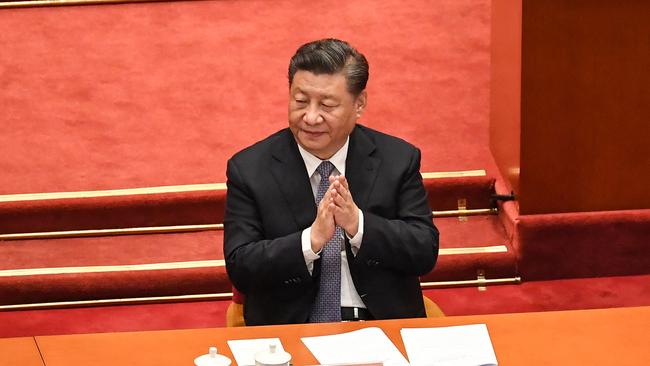
And any such pain will impact global growth and, in time, sharemarkets.
Apart from the economic impact, China has other incentives to convince the increasingly dangerous Russian dictator Vladimir Putin to negotiate a ceasefire.
Indeed, if such an arrangement can be negotiated, China’s President Xi Jinping can now see a way forward to achieve global gains for the country that previously seemed unattainable.
As I explained last month under the heading “Putin’s invasion of Ukraine has upset China’s vast fast-rail project”, for Xi, the massive 9000km train line linking the Pacific and Atlantic oceans is no ordinary infrastructure project.
When at the 90th National Congress of the Chinese Communist Party in 2017, Xi was ranked with Mao Tse-tung and Deng Xiaoping in the party’s constitution, Belt and Road infrastructure project, spearhead by the rail project, was also incorporated into the document.
If at the 20th National Congress, to be held later this year, it emerges that the rail project has been delayed indefinitely because it can’t pass through Russia and Ukraine it will be a severe blow to the high standing of Xi.
He will want the rail line to be part of the Chinese contribution to restoring Ukraine.
But there are other advantages for China in a peace agreement rather than a long struggle that destroys the Russian economy. A destroyed Russia becomes dangerous and even a burden on China.
But a damaged Russia can work with China, albeit that Russia is likely to become more and more dependent almost to the point of being China’s western satellite. This is a dream long held by the Chinese but made possible by Putin’s Ukraine invasion mistake.
At the same time, China wants America to substantially reduce it presence in “China’s backyard”- the Pacific region. Prior to Ukraine, NATO was divided and, partly as a result of Australian efforts, the US had switched its attention to the Pacific region.
Ukraine has united Europe and re-established strong links across the Atlantic. China now hopes that the US attention will switch back to the Atlantic. Of course this is not in the interests of Australia.
At the same time, China looks like it will emerge as the major air power in the Pacific/India ocean regions. The Russian-built Sukhoi fighters were ordered by both Indonesia and India and it seemed Russian technology would lead air power in the region. Both orders have been cancelled because the Russian aircraft and their spare parts backup were unreliable. Both India and Indonesia are purchasing the French Rafale fighter jets.
Confirming the problems recognised by India and Indonesia, the advanced Sukhoi fighters have been a disappointment for Russia in Ukraine.
In the US, Air Force Chief of Staff General Charles Brown and others have has highlighted the problems of the Joint Strike Fighter-F-35 and the US recently slashed its orders for the troubled aircraft.
China’s J-20 fifth generation fighter originally used engines built in Russia but they are now being replaced by Chinese built engines and the J-20 will now rival America’s ageing F-22 aircraft. These air power developments have long term significance for Taiwan.
Meanwhile if there is no cease fire agreement and the war continues, the damage to China will be intensified.
ANZ Research points out that Ukraine and Russia play important roles in global semiconductor supply chains which provided around half of China’s 2021 trade growth. Ukraine supplies purified rare gases such as neon and krypton, both essential in making semiconductors, and produces precious metals used to make chips, smartphones and electric vehicles.
China is also being hit by the disruptions to the nickel and oil markets caused by the war. China is the biggest importer of oil and nickel that is a vital part of its electric vehicle manufacture. China is the world’s largest EV producer globally. Exports jumped 2.6 times to nearly 500,000 last year.
China’s trade surplus, which reached a peak of $676bn in 2021, could slump to $238bn this year.
If continued, the war in Ukraine will inevitably slow global growth particularly in Europe. Currently sharemarkets are focusing on interest rates and assuming that there will be a peace in Ukraine. If peace talks fail it will put further pressure on sharemarkets.






Increasingly China is set to be a significant beneficiary from a peace agreement in Ukraine. Conversely as the atrocities being committed by Russians multiply in their frustration from being bogged down in a war with Ukraine, so the Chinese economy is set to suffer considerable pain from an extended conflict.